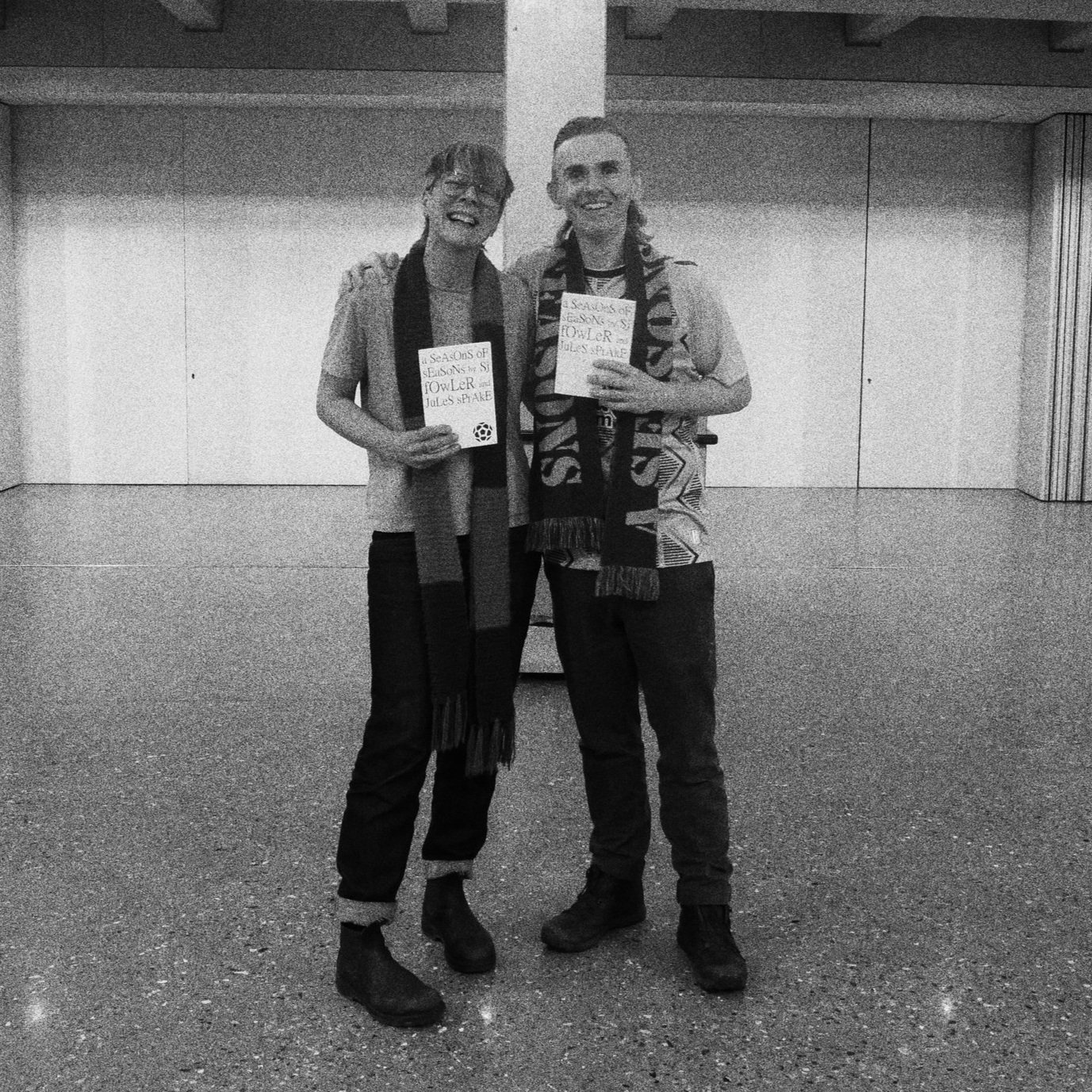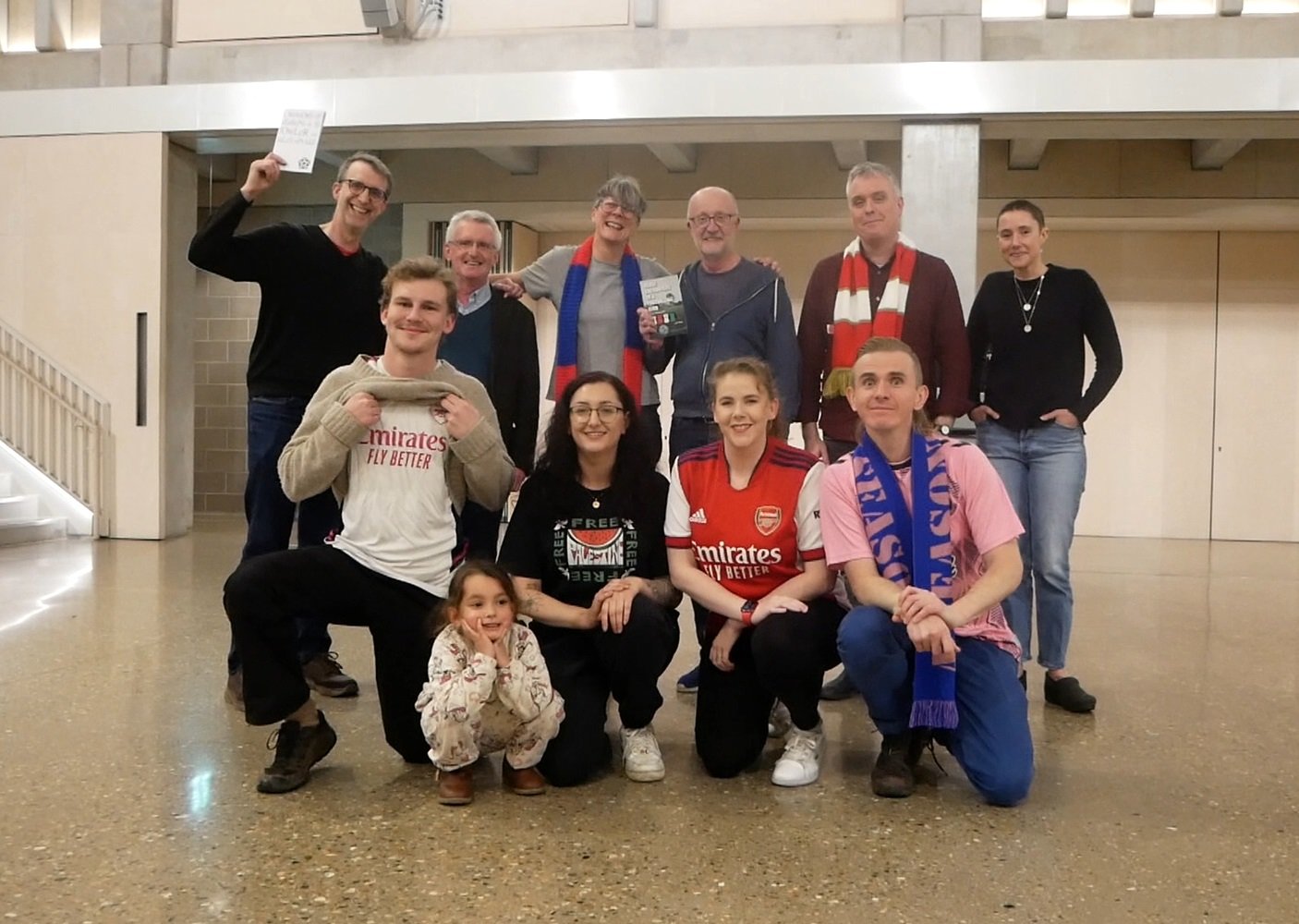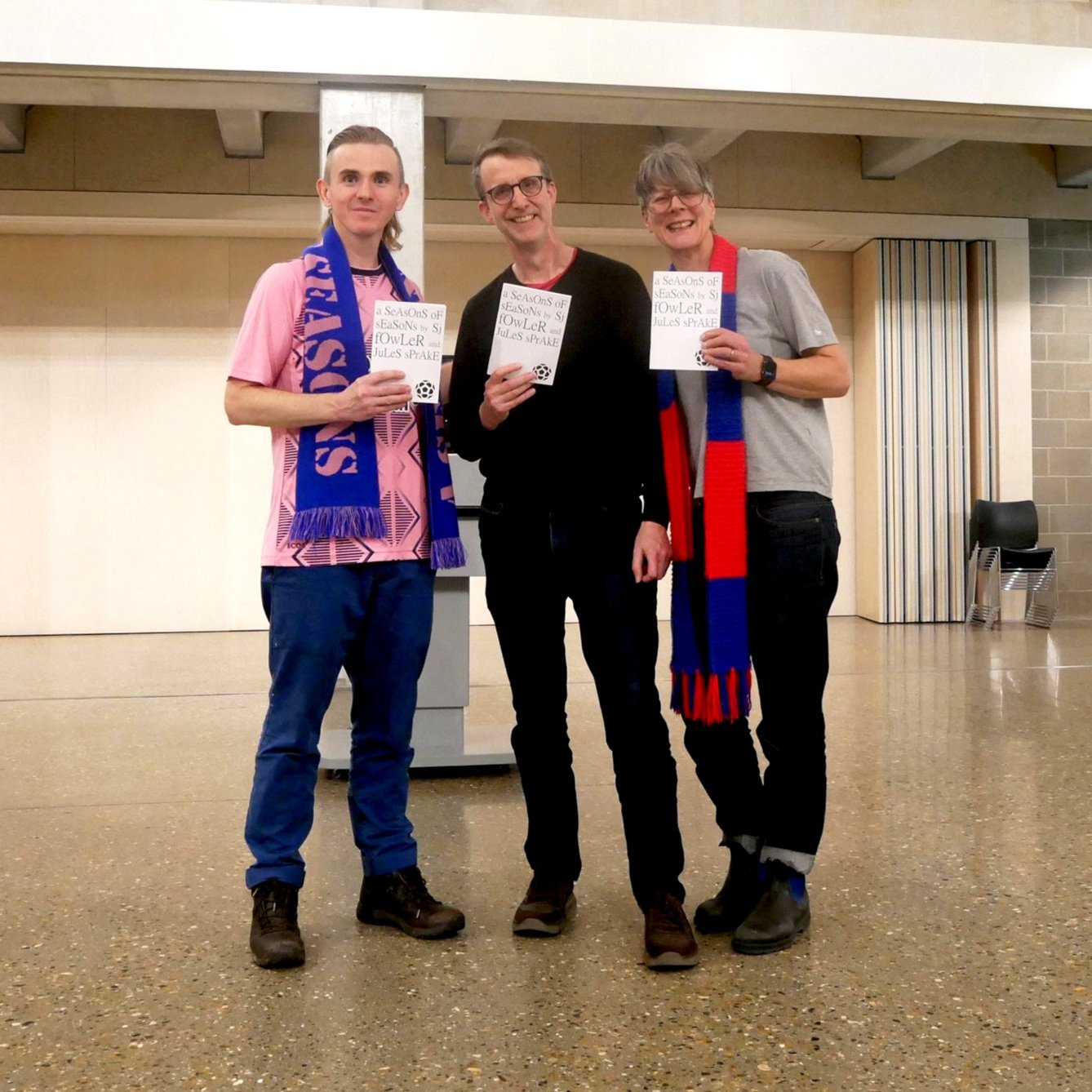A Seasons of Seasons
by Jules Sprake and SJ Fowler
buy it here for just five pounds https://sampsonlow.co/2023/12/12/a-seasons-of-seasons-sj-fowler-jules-sprake/
On the publication - A unique document in experimental poetry that celebrates the bone deep passion and pain football inflicts upon its followers. Written ostensibly to follow the turbulent 2022 / 2023 premier league season from the perspective of two lifelong fans of Crystal Palace and Everton respectively, A Seasons of Seasons then spirals out in the mass language ether of the world's most popular game. Unusual for it's methodology as well as its content, dragging in British poetry revival stalwarts alongside Pier Paolo Pasolini, Roy Hodgson and Sean Dyche, the book is a fusion of poetry, found text, collage, illustration, redaction and ground up collaboration.
"Football, like poetry, is an artform that not so much encourages obsession as demands it. The back and forth between Fowler and Sprake perfectly captures this baroque particularity. Talking about football with a poet is usually like talking about tofu with a mountain lion: they know what it is, but they don’t see how it applies to them. So it’s a pleasure to read A Seasons of Seasons, a text, at last, for the intersection of the Venn diagram, perfect for a cold, wet Tuesday night in Stoke." Tom Jenks
A SEASONS OF SEASONS : LAUNCH
at Writers Kingston event #69 : Football and Literature event
Kingston University Town House - December Tuesday 12th 2023
The game of games, the great game, the beautiful ball game - a night of weird and heartfelt literary celebration! Writers of all kits shared poetry, fiction, non-fiction and performance on the world’s most popular sport, in all its facets, from the abstract to the obvious. With local and visiting writers alongside students and staff of Kingston University, this was a memorable night in the RIBA award winning Town House in Kingston. Featuring Jules Sprake and SJ Fowler / Tom Jenks / Peter Dunkley and Ian Brady / Matt Sokulsky / Marcia Knight Latter / Julia Rose Lewis / Safia Kamel. https://www.writerskingston.com/football/
Afterword - a dialogue on ‘A Seasons of Seasons’.
FOWLER Q - April 4th 2022 we all went for a meal after an event in Kingston and I remember that as by chance we sat next to each other and got into football and though you were very humble that was the moment I realised you were a more die hard fan than me. We would have been good friends no matter what, but sharing this connection to the sport and our respective teams definitely accelerated our connection I think. As football does. Easy questiom - can you tell me about your entire history with palace and what football means to you?
SPRAKE A - I’m wearing a brown corduroy jacket, my brother has one too. We’re two years apart, same birthday. But he decided to support Liverpool. It happened after we’d both been to Selhurst Park with dad. He didn’t go again. Sometimes grandad still came, though. At Brighton near where he was living then, it’s half time. A bloke on the terraces offers grandad his hip flask. Don’t tell your nan, he says.
That was before he moved to Eastbourne 'the sunshine coast'. When Malcolm Allison doffed his fedora to the terraces. And Terry Venables signed Vince Hilaire. I made a football scarf for dad. It was the red & blue sash on white season. Jim Cannon & Dave Swindlehurst before Ian Wright & Mark Bright. Holey and halfway, nan please help. Your tassels made it look so nice.
Boxing Day, Iain Dowie era and my first season ticket, we’re home at Selhurst. The pitch is frozen, kick off delayed. Grandad shifts in his seat. He’s quite bony now and our festive pies are cold. I feel bad for bringing him. He didn’t go again. Grandad leaves an ansaphone message for when I get home from another match which we won like it was the FA cup.
Hello Crystal Palace, Eastbourne here. 1. 2. 3. 4. 5. Up the Palace. Until his 100th birthday. Back in Croydon now. Not by choice. Julian Speroni comes to the party. Grandad’s in his palace tie for the picture. Julian really is one of the nice guys. I cried at his testimonial, remembering. Moths have hatched into Grandad’s scarf. It smells fusty. Nan-knitted in glaziers claret & blue. Wash mild & gentle old man.
I have a new family now. Lin. Nigel. Pete. Terry. Dave. Grace & Max. And sometimes big John who swapped seats so Dave can sit with his dad. The talk is mid table, best player sell offs, occasionally aspiring to a Wembley final. That’s how it’s always been.
SPRAKE Q - What's your relationship with football? And with everton fc?
FOWLER A – My grandfather supported the club, and did so with deep roots in its culture, when there was a sectarian element to the big two Liverpool teams. My father was brought up going to the games, walking from his house near Rice Lane down to Goodison just after World War II. He grew up playing in bombsites, playing football, in the late 40s and 50s. His brother, all my cousins, all my family on his side, are die hard blues for a century. I was raised the same, but outside of Liverpool, as I didn’t grow up there. So Everton became for me a kind second hand nostalgia for an intense culture I was told I came from but didn’t belong to. It was obviously a way to share something deeply with my father too. He had trials for professional clubs when he was younger also, Liverpool boys even, and my brother had trials too. So playing football was also a big part of my family. By my father’s design I played rugby more seriously instead, and there’s lots of class stuff to unpack there. For myself I did martial arts because beyond mucking around with mates at lunchtime, I didn’t feel at home in any team sport.
When I young Everton was so important to me I would sulk if they lost. I wouldn’t do my homework. And this is the Mike Walker era, so I didn’t do as well as in school as I should’ve. Once my Dad took me to meet the team while they were on a training holiday at a golf club near where we lived. Paul Gascoyne signed my shirt after he finished his cigarette.
For a long time, unlike you, as an adult, the game and the club went to the background a bit. I felt removed from football a bit, like it was something from my childhood. But in the last five years something clicked again and it’s a major part of my life. I read more about football than I do about poetry.
FOWLER Q – The process of this book has been such a joy for me, so organic and generative – it really has come out of us becoming friends while sharing an intense passion for football.
I really enjoyed how our process evolved too. We began by exchanging fragments of text about specific games through the season, then these became poems, intertwined, truly overlapping, then we ditched the games constraint, then you created visuals, then I added some, then we wrote through the texts again and again and again.
But then I have had the pleasure of doing a lot of collaborations like this, so I wanted to ask you how you found the process in more technical terms? Compared to stuff you’ve done before? And the methodology? For example the visual poems you have created for this publication are remarkable, did they respond to our text, or did you just work them up using your long standing skillset with print and design?
SPRAKE A - I’ll add in the voice messages as an important element of that evolving process. lovely to be in touch with you in a more chatty, lugubrious mode
I would have to get over the sound of my own voice. Press to record, release to send. This easy mechanism meant I could do this without hearing back before sending. Mid-game messages were my favourites. Lucky pants, VAR, Sainsbury’s. And when you bought two pink Everton shirts in the before-the-end-of-season sale. By voice and text we exchanged moods, commentaries, commiserations (mostly these). im really happy for you
To start with, I wrote every matchday. I had a folder called ‘words’ and dropped other stuff into this. Transcripts, memes, headlines and started to collage. Matchday poems started to take shape and we knew a publication could be made of this season. and you are the season of seasons mate! o my god that is the best title!
And I began to loosen up a little. Stickers, subbuteo, jerk shack, t-shirt, vinyl record, used tickets, lucky pants, scarves, flares, commemoration bricks - football’s ephemera - were very much instigators and responders to our text. As you say, truly overlapping. Towards the end of the season, you asked if you could write through all the words and this when I started to focus more on visuals that might work alongside in the book.
im really happy i think i finally cracked the tone of the poems
This tone is important. For me, it’s what made our visuals too. We were able to combine, squeeze and make it work as a set of poems. I so enjoyed sending you a visual, seeing where you’d place it and connect with the texts. Teeth and claws into Roy Hodgson. Quality. i love em
And so do I, Steve. You’ve also provided much needed collaboration experience to make this thing actually come out into the world. And we’ve become such friends.
SPRAKE Q - You said that other work you were reading was influencing how you wrote through our text. And then you found a copy of Bill Griffiths’ football themed collection, ‘Our Winter Game’. What was important about these influences for you? How did they contribute to the tone of our work?
FOWLER A – The first reading I ever went to was the memorial for Bill Griffiths. I had no idea what a poetry reading was like. In a way, that set me up for disappointment. But what it also did was root me into his work as a kind of ghost blanket. While I got to meet poets like Tom Raworth and learn from them directly, I always felt Bill Griffiths was a loss to me, that I started to get into writing just after he died, died too young.
So I wasn’t at all looking for football poems to influence us, not in anyway, as I could imagine how bad they would be, and if anything that is the point of writing about football in the way we have, that we do it through the lens of an original style, method, tone and general approach. But then, by accident, I found Our Winter Game, published by Veer, who did my book on boxing, Fights, which is the thing that I’ve done that most reminds me of A Seasons… an excavation of a popular thing through idiosyncratic means.
From Griffiths I then leaped on other poets like him, Raworth whom I mentioned, but others like them. Poets who have something in common, very vaguely, a kind of immediacy of register, a speed, that seems connected to non-academic, more working class speech. But not quite that. Poets who wrote in complex ways but rejected puff. British poetry revival poets, Robert Sheppard in there too, Maggie O’Sullivan. Those poets had been where I started, and I needed them here, for we were writing about not just football in general, but English football, English football culture. Our book is as much about our home country as it is the game of football itself.






